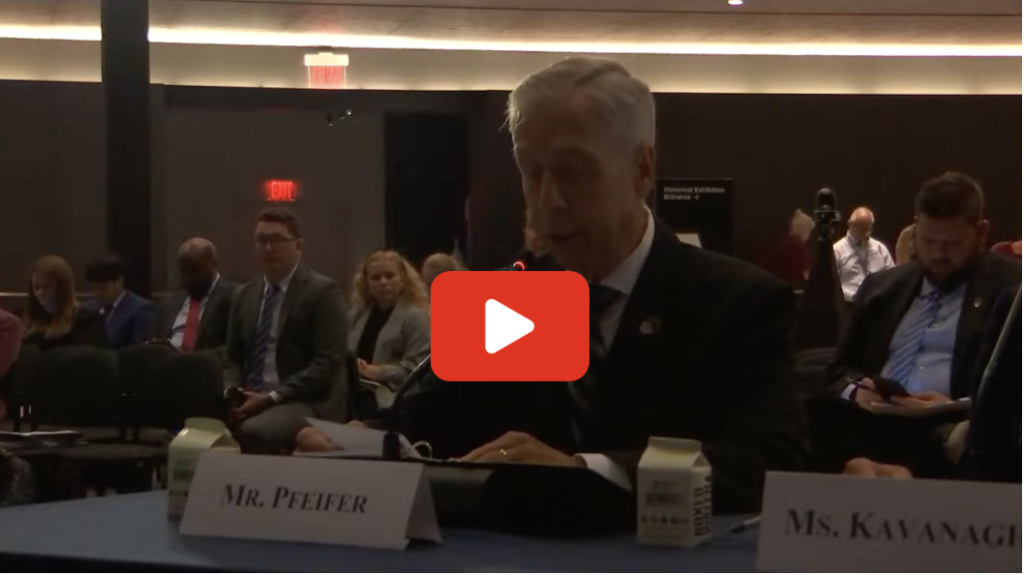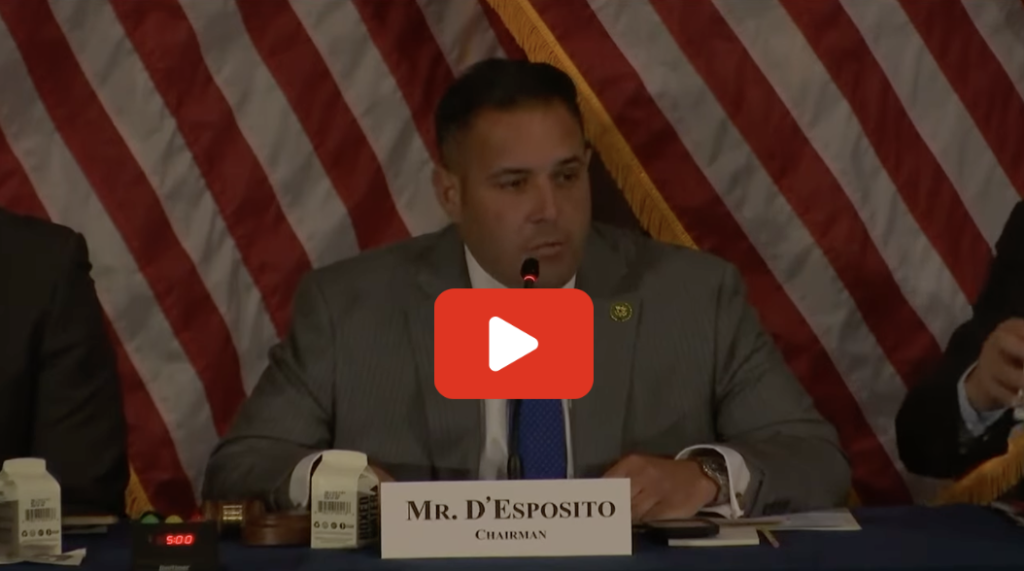ICYMI: 9/11 First Responder, Emergency Management Partners Testify on Securing the Homeland 22 Years Later
September 15, 2023
WASHINGTON, D.C. — This week, the Homeland Security Subcommittee on Emergency Management and Technology, led by Chairman Anthony D’Esposito (R-NY), held a field hearing at the 9/11 Memorial Museum to examine our nation’s evolving threat landscape over two decades after the September 11th terrorist attacks and advancements made in emergency preparedness in its wake. Joseph Pfeifer, the First Deputy Commissioner of the New York City Fire Department; Laura Kavanagh, Commissioner of the New York City Fire Department; Rebecca Weiner, the Deputy Commissioner of Intelligence and Counterterrorism at the New York City Police Department; Patrick Ryder, the Commissioner of the Nassau County Police Department; and Greg Ehrie, the Chief Security Officer at the Port Authority of New York and New Jersey shared their critical testimony.

In his opening statement, Mr. Pfeifer shared his harrowing story as the first fire chief to respond to the terrorist attacks on 9/11:
“With my firefighters and first responders, we looked at the burning North Tower and knew that we were going to the most dangerous fire of our lives. Without hesitation, Firefighters approached me to ask, ‘Chief, what do you need?’ I directed them to ‘Go up, evacuate everyone, and rescue those who could not get out.’… I heard the loud rumbling sound of each 110-story World Trade Center Towers collapsing to the ground. In the dark dust cloud of crumbled concrete and twisted steel, I could not see the hand in front of my face, and I wondered if I was still alive. In just 102 minutes, our world had changed forever as we witnessed the mass murder of nearly 3,000 people, including 343 of my firefighters, one of whom was my brother. In the aftermath, the 9/11Commission Report identified several critical changes for municipalities to improve intra-agency communications and coordination. The Fire Department embraced the mandate to adapt to the threat of terrorism by enhancing emergency response capabilities. We conducted an in-depth after-action review and strategized ways to make improvements. We created a state-of-the-art Fire Department Operations Center.”

In his opening line of questioning, Chairman D’Esposito asked Ms. Weiner about the current threats to the homeland over two decades after 9/11:
“Can you give us a sense of the threat that foreign terrorist groups pose today and how it has changed over the past 20 years?”
Ms. Weiner answered:
“This is an enduring threat, it’s a persistent threat. And, as I mentioned, though it manifests differently today than it did on September 12, 2001. It’s a threat that we’ve arrayed tremendous resources and need to continue to array tremendous resources to combat. Al-Qaeda and ISIS continue to inspire homegrown violent extremists across the country and here in our area of responsibility in New York every day. This continues through propaganda, this continues through plotting, this continues through the investigations that we collectively, with our federal, state, and local counterparts, carry out to make sure that it doesn’t manifest in violence in our streets. This is in addition to threats posed by nation states. I mentioned Iran briefly earlier—but the emboldened Iran and activities targeting dissidents here in our city. Targeting former U.S. officials in threat streams are of great concern to us at the NYPD and in concert with our federal partners. The nexus to international terrorism remains strong… The programs that we just described are put into place to make sure that collectively we can meet threats where they emanate from before they materialize on our streets.”

Rep. Nick LaLota (R-NY) asked Mr. Pfeifer about the advancements made in information sharing since the attacks:
“We here are committed to ensuring that we give you the resources, the tools, the policies, the rhetoric—things that we can do to ensure that you do your jobs effectively… This was a failure 22 years ago of intelligence sharing, of communication sharing. We didn’t know the things that we needed to know 22 years ago to thwart this incident nor to respond to it in a maximum capacity, and I appreciate your efforts to get better at this… Can you explain into greater detail, sir, as to the advancements that you’ve made and to the extent that you share, the FDNY shares, the Port Authority, NYPD or other agencies—that your equipment is interoperable with them, that your tactics, techniques, and procedures are compatible with other agencies. Can you tell me what advancements we’ve made in the last 22 years?”
Mr. Pfeifer answered:
“We share radio frequencies. We share video into our emergency operations center, there is a live video feed from NYPD helicopters. I certainly would’ve loved to have seen that 22 years ago, but we do it now. We have also worked with the private sector, getting live feed videos from their helicopters. We work with the Port Authority. Not long after 9/11 there was a threat against the bridges, particularly the George Washington bridge. I sat at a law enforcement meeting—just imagine a bunch of police and one fire guy in the back. And I raised by hand and said, ‘how do you collapse a bridge?’ And nobody knew. And the Port Authority invited me into a meeting the next day with the engineers, and we sat down—Port Authority, NYPD, FDNY—and we found out how that would occur. Then I gave them some ideas, and then we changed procedures.”

Rep. Dale Strong (R-AL) asked Ms. Weiner how the influx of migrants is affecting the safety and security of New York City:
“My father was a 23-year fire chief. It inspired me. 39 years, myself, from a junior firefighter to assistant chief…A lot has changed in 22 years. From VHF radios, UHF radios, to digital interoperability. That’s what we’ve learned from this. It’s unbelievable—how many lives have been saved? Ms. Weiner, you mentioned, you were a grant of about $125 million. Does it concern you that Mayor Adams is considering cuts because of so many illegal aliens coming to New York?”
Ms. Weiner answered:
“The funding that we’ve just been talking about to support our counterterrorism operations here and to make sure that as we navigate collectively all of these other priority areas, we do not forget our counterterrorism operations—this is critically important. Federal funds are what allow us to continue to do that and to make sure that September 12, 2023 is a reminder that we will never go back to September 12, 2001.”

Rep. Josh Brecheen (R-OK) detailed the evolving threats caused by our open border and questioned Mr. Ehrie on the Port Authority’s role in emergency response to the humanitarian crisis:
“The very existence of this Committee is a result of what happened here 22 years ago… Your courage and your bravery is an inspiration to our country… With that said, there are problems that we have to work through. … What are you all doing, and what is your advice to other cities as we make sure that we are trying to be wise in stopping another 9/11 activity.”
Mr. Ehrie answered:
“The Port [Authority] supports both the state and city to house and to vet these individuals when they come here. … We look at the challenge every way. We deal with it collaboratively, we talk to our intel partners, we do the best we can with the technology, but it’s a concern. More people of any stripe coming to this city. Much like today or yesterday when we had the festivities and commemoration here to think about the attacks on 9/11—people come here, and it’s a flooded area, and we have to take those security precautions..”
